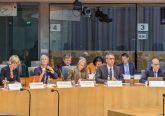 John Sentamu, the Archbishop of York, recently posted a long statement explaining his opposition to same-sex marriage. Some of it appeared in the Guardian and on the Guardian’s CIF Belief blog. In it he referenced an interview he recently gave to the Daily Telegraph, which contains the following statement:
John Sentamu, the Archbishop of York, recently posted a long statement explaining his opposition to same-sex marriage. Some of it appeared in the Guardian and on the Guardian’s CIF Belief blog. In it he referenced an interview he recently gave to the Daily Telegraph, which contains the following statement:
We supported Civil Partnerships (the bishops in the House of Lords), because we believe that friendships are good for everybody.
Like other religious opponents of same-sex marriage, he goes on to argue that civil partnership is “in every respect in ethical terms an honourable contract of a committed relationship”. Same-sex couples, he therefore says, should not press for marriage.
But his factual claim is false. The main Lords debate on the Civil Partnership Bill took place in June 2004. Richard Harries, then Bishop of Oxford, did indeed signal C of E support for civil partnerships. But his efforts were contradicted by the five conservative bishops who spoke on the other side. Going by the bishops’ contributions to debate, the score is 5/3 against. Going by the bishops’ votes, it is 6/1 against. Six bishops voted for a successful wrecking amendment in the name of Baroness O’Cathain, which made the bill unworkable. Only the Commons’ insistence on rejecting the O’Cathain amendment made it possible to enact civil partnerships.
There is joy in heaven when a sinner repents, so they say. But the Archbishop seems quite unrepentant. He might have graciously said: “We were wrong about civil partnerships. Now we see the error of our ways and would like to celebrate the honourable estate of civil partnership”. Rather, he makes a claim that is not only false, but whose falsehood is quite easily checked in Hansard.
There is a pattern here. Since 2004, several speeches and votes of bishops in the House of Lords have opposed both equal rights and, I am sorry to say, religious freedom. In January 2010, the bishops were pivotal in defeating a proposal in the Equality Bill that would have defined the class of posts for which the religious exemption from anti-discrimination law would apply. The then government lost three divisions on the subject, one of them by only five votes, with eight bishops opposing the government. With a General Election looming, the Labour government was unable to reverse that defeat in the Commons.
That vote could be defended on grounds of religious freedom. But then what should we make of the then-bishop of Winchester? He said in the same debate:
[M]arriage has a character that is distinct from that of a civil partnership. Churches of all sorts really should not reduce or fudge, let alone deny, that distinction.
He was attacking a proposal from the Labour peer Lord Alli which would have allowed those religious denominations who so wished to celebrate civil partnerships on their premises. In the same breath as defending the right of the Church of England to discriminate in employment, he wished to deny to Quakers, Unitarians, and Liberal Jews any right to celebrate civil partnerships among their own members, in their own premises, according to their own consciences, and using their own liturgies.
The Alli amendment was withdrawn, but when it was re-presented in March 2010, it was carried by a large majority of the Lords. The bishop of Bradford’s vote against cancelled out the bishop of Newcastle’s vote in favour. However, in December 2011 Baroness O’Cathain used a rare procedural device to “pray” against the implementation of the amendment, which now forms section 202 of the Equality Act 2010. If successful, her prayer would have made the section a dead letter, once again forbidding those denominations that were ready and willing to celebrate civil partnerships from doing so. The bishop of Blackburn supported her prayer; the (current) bishop of Oxford opposed it. Her motion was withdrawn.
The most eloquent supporter of religious freedom in the House has not been a serving bishop, but a retired one, Richard Harries. The former bishop of Oxford now sits in the Lords as a crossbench peer, and has spoken on the side of religious freedom in all the debates mentioned above. As he wrote to the Guardian on 21 May,
The great flaw in [John Sentamu’s] argument is that he does not urge the church to bless such partnerships. This would do more than anything to obtain that greater public understanding he says he wants… [I]t is a chance for the Church of England to make amends for the reluctance with which it accepted civil partnerships in the first place.
Lord Harries is quite right. John Sentamu opened his latest Guardian piece by saying that “the churches have, at times, been complicit in this [viz., discrimination against homosexuals]. There is much penance to be done”. I have two modest proposals for the Archbishop.
Practical penance no. 1: I repent of my church’s complicity in discrimination against homosexuals. Therefore I announce that the Church of England will permit those of its vicars who so wish to celebrate civil partnerships in their churches.
Practical penance no. 2: I promise to desist from incorrect statements about the bishops’ speaking and voting record.
This article was published in an edited form by the Guardian, and is reproduced here with their kind permission.
You can also read Scot Peterson‘s earlier article on the same subject – Religious freedom, religious equality and religious establishment: a toxic brew – here.
Iain McLean is a professor of politics at Oxford University and author, most recently, of What’s wrong with the British Constitution? (OUP 2010). He is a Quaker.







3 Comments
I am struggling to understand some of this analysis. It seems to lack the ability to see the other person’s point of view.
Firstly, you say that Archbishop Sentamu is wrong to claim that the C of E “supported Civil Partnerships , because we believe that friendships are good for everybody”, because they supported Baroness O’Cathain’s “wrecking amendment”. I had to search to discover that the amendment permitted civil partnerships between those in family-type relationships, making it more obviously a Bill about friendship (rather than quasi-marriage for gay and lesbian people). So, according to Sentamu’s reasoning, O’Cathain’s amendments made the Bill better, not worse. The bishops supported civil partnerships – but not the quasi-marriage that you appear to support.
Secondly, you attack the logic of the Bishop Scott-Joynt’s statement on civil partnerships on religious premises. You say that it is a restriction on religious freedom, and I can understand that this is a powerful argument. However, isn’t there a certain logic to his argument? We have seen that the C of E’s support for civil partnership was conditional to it being a form of friendship, not marriage. Churches do not collect taxes, issue driving licences, register births, or sign death certificates. They do conduct marriages. Allow a religious organization to conduct civil partnerships would inevitably invite confusion. So the bishops were anxious to ensure that the two were not confused.
The authors presumably disagree with the bishops’ actions, but that does not necessarily make them hypocritical.
And practical penance no.1 is a complete non sequitur.